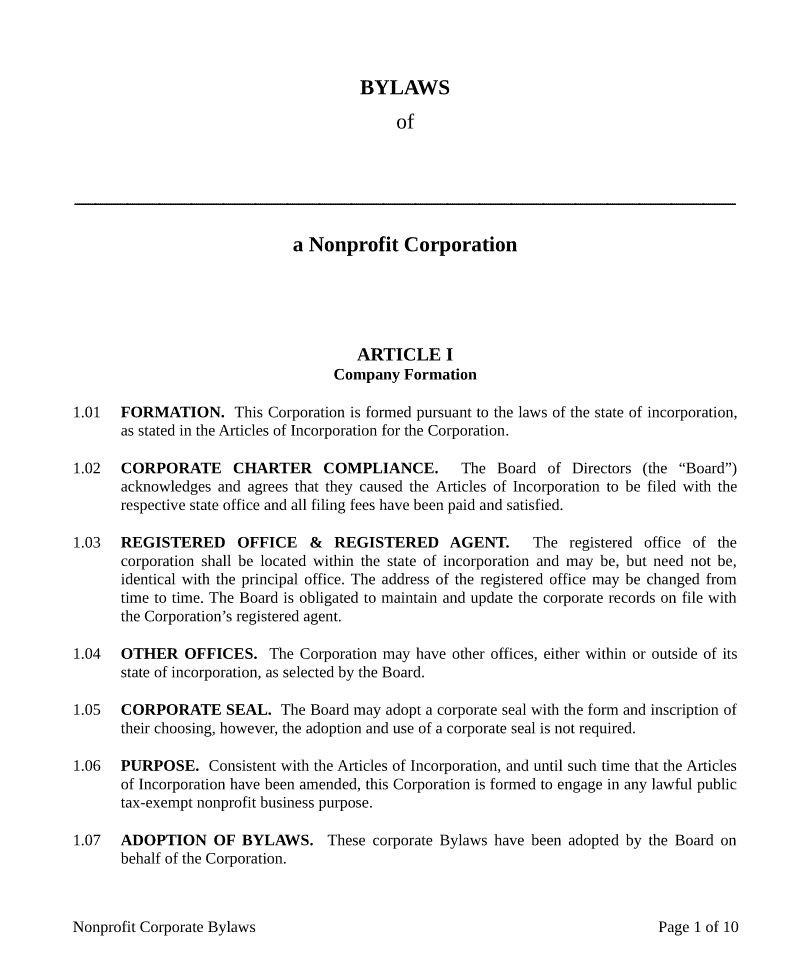Massachusetts Nonprofit Bylaws
Massachusetts nonprofit bylaws act as a guidebook for how to run your organization. Covering everything from voting procedures to emergency protocols, the bylaws are a tool for the board of directors to use to make decisions and solve problems.
Bylaws are a fundamentally important document for your nonprofit’s success—because of this, it can sometimes feel overwhelming to start the writing process. You can use our attorney-drafted nonprofit bylaws template to get started.
Why does a Massachusetts nonprofit need bylaws?
While you don’t need to file your nonprofit bylaws with the state of Massachusetts like you do other formation documents (like your Massachusetts Articles of Organization, for example), the bylaws are no less important.
Nonprofit bylaws function as a how-to on running your organization, and the bylaws list out the legally binding rules and procedures for the nonprofit to follow.
1. Adopting nonprofit bylaws is standard practice in Massachusetts.
Per MA Gen L ch 180 § 6a (2020), bylaws “may” be adopted—meaning that it’s not absolutely mandatory. However, adopting bylaws is so common that Article V of the state-issued nonprofit Articles of Organization includes a statement that bylaws have been duly adopted. So although you won’t need to file your bylaws with the Secretary of the Commonwealth, it’s standard practice to adopt bylaws.
2. Third parties will ask to see your bylaws.
Nonprofit bylaws can work as proof your organization’s existence—for opening a business bank account, for potential donors looking at your business structure, and for any other time in your organization’s existence where you need proof that you have practices put into place. The Massachusetts will need to see the bylaws if you apply to become a public charity, and the IRS will ask for your nonprofit bylaws if you decide to apply for 501(c)(3) tax-exempt status.
3. Nonprofit bylaws allow you more control over your nonprofit.
Your bylaws act as a guidebook for your nonprofit to follow. Since your bylaws will list out how to handle things like conflicts of interest and record keeping, the more thorough your bylaws are, the less likely you are to face a dispute over a decision made. Even if a dispute occurs, if your bylaws have a process already in place, the dispute can be handled internally.
However, when the bylaws are incomplete or unclear, handling disputes can get complicated. Having clear bylaws prevents the state’s involvement in what would otherwise be an internal process.
Want to learn more? Check out our Guide to Nonprofits.
What do Massachusetts Nonprofit Bylaws include?
Bylaws for your Massachusetts nonprofit can include anything that does not go against the laws of Massachusetts and the statutes already in place. According to MA Gen L ch 180 § 6a (2020), the bylaws help the nonprofit determine processes and procedures like appointing new members and dissolving the nonprofit. Bylaws also include topics such as:
- Director duties and compensation
- Member rights
- Tenure limits
- Meeting and voting requirements
- Dispute procedures
- Conflict of interest policies
- Emergency protocols
- Bylaw amendment procedures
Are nonprofit bylaws legally binding?
Yes. Your bylaws are legally binding regulations for your nonprofit and those acting on its behalf to follow. There could be internal and external (such as legal) consequences if the bylaws are not followed.
Are nonprofit bylaws public record?
Not necessarily. Your nonprofit bylaws are technically an internal document that is used for the operating of your nonprofit. However, if you decide to apply for 501(c)(3) tax-exempt status with the IRS, you will have to submit the bylaws alongside your application. This means the IRS will make your bylaws part of public record.
FAQs
No. Your bylaws will be legally binding regardless of if you get signatures or not. So why would you even bother? Well, we recommend having your board of directors sign the bylaws simply for the sake of efficient communication—it ensures that everyone is on the same page when the bylaws are first adopted.
Yes. Your nonprofit will include the process on how to amend the bylaws within the bylaws’ initial draft itself. From there, you can change the bylaws as your board of directors sees fit.
The board of directors will adopt your nonprofit’s bylaws at the first organizational meeting, according to Chapter 156B § 12 (2020) of the Massachusetts General Law.
